Best Price Guaranteed | New Zealand Campervan Hire | Email, chat or call the Spaceships NZ Crew

Hit enter to search or ESC to close
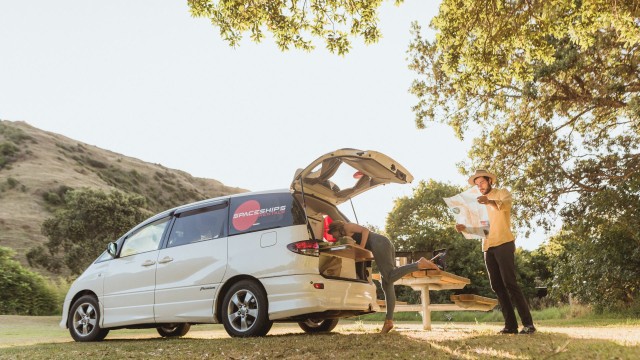
Your Free Guide to Camping in NZ: Experience the Freedom to Camp at Amazing & Remote Places (based on the new rules)
08 July, 2024
Posted by Marty | Spaceships Crew
The rules for self-contained camping in New Zealand might change, but that doesn’t mean that your camping experience in New Zealand will change. We’ll guide you through the massive amounts of rules and interpretations that you might find online or on social media.
At Spaceships, we are massive fans of camping at amazing, remote places in New Zealand... And we are determined to make sure everyone follows the rules about freedom camping in New Zealand.
Where can I freedom camp in New Zealand? Is camping in New Zealand free? These are some of the popular questions international travellers and first-time campers ask. Our Support Station's Camping Section (FAQ) is packed with questions & answers like these.
In this article, we’ll share more detailed info about camping in New Zealand and freedom camping.
Is freedom camping the same as free camping?
Freedom camping is the freedom to camp at amazing places. A lot of people confuse freedom camping with free camping. Yes, freedom camping can be free but it can also be done paid as there are a lot of great budget freedom camping spots in New Zealand.
The challenge around freedom camping (and free camping) is that there is a lot of info out there, some is correct but a lot of it is confusing or even incorrect. You may get varied answers from different people or blogs. Another reason why we have gathered all the info about freedom camping in New Zealand and created this article for you.
What is freedom camping?
A lot of travellers think that freedom camping is parking your campervan in areas that are not always meant for camping, for example on the side of the road. This is a mistake that many first-time travellers to New Zealand make. You simply cannot park and sleep in your campervan just anywhere. There are rules about where you can and can't (freedom) camp in New Zealand.
New legislation has been introduced throughout the years, with the latest updates coming into effect in 2024 and 2025. The rules for the certification of self-contained campervans are changing as we've outlined on this page.
Another change is that the infringement fees for freedom camping in non-designated places have been increased. It may be a cheap option for a night but that one night could cost you a minimum penalty of $400 and can get as high as $2,400, depending on the severity of the camping offence.
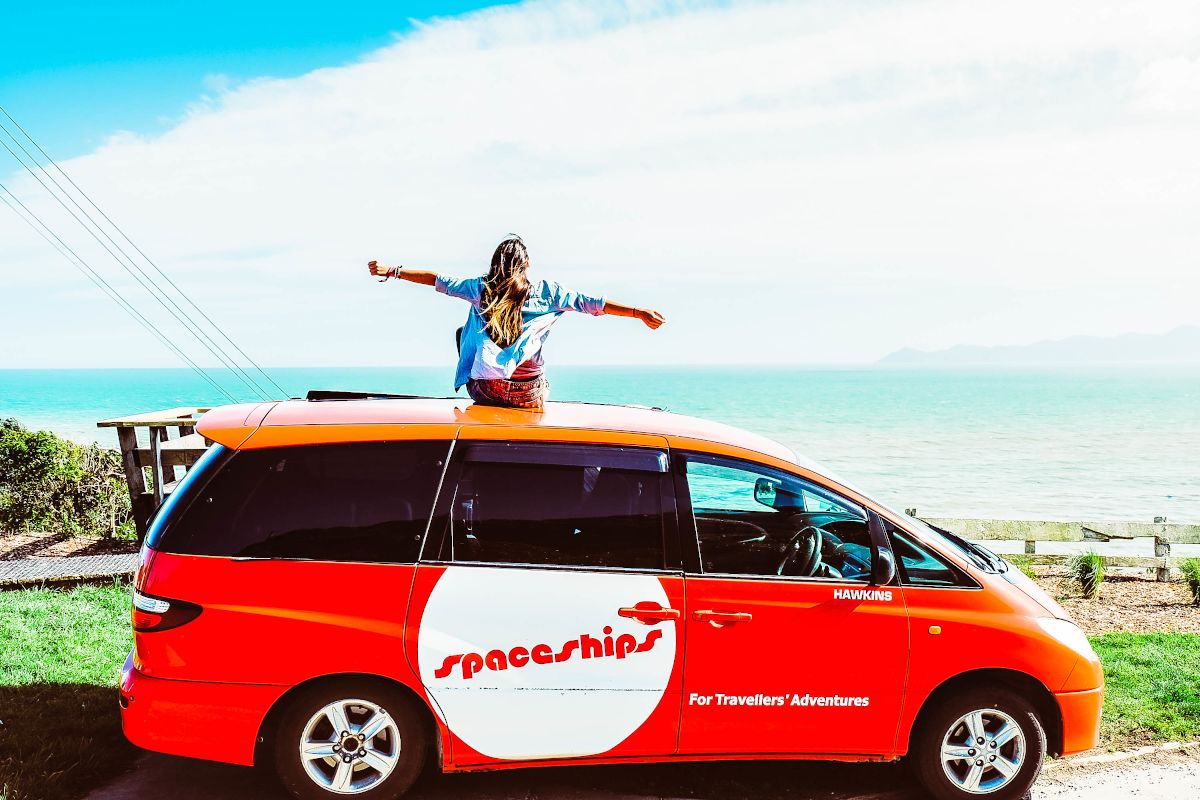
Free as a bird on your NZ road trip: the freedom to explore outer space with Spaceships
Where can I camp and sleep in my campervan?
Do the words "designated camping area" or "camping site" sound boring to you? No worries, they are definitely not boring. A designated camping site or freedom camping spot can be located in amazing, remote places. Places that can only be reached by a dirt road and where you and a few other campers will spend the night on a basic campsite. Or it can be close to the main motorway, next to a river or in a forest.
Camping sites can be found just anywhere in New Zealand. There are 1000s of free and budget campsites where you are allowed to camp. They will give you the freedom to camp and to enjoy New Zealand's amazing scenery.
Support New Zealand’s nature and amazing scenery by camping
A campervan road trip is more than the most flexible way to explore New Zealand's nature. It is also a great way to give back and to support New Zealand's unique nature and scenery. By camping at one of the many DOC campsites, you will be doing that.
DOC is NZ's Department of Conservation, a government agency focused on conserving New Zealand’s natural and historic heritage. By staying at a DOC campsite you are supporting the work of DOC while being super close to what they are conserving and protecting. Prices of DOC campsites vary and depend on the type of campsite.
- Basic campsites: free
- Standard campsites: $10 to $15
- Serviced campsites: $20 to $23
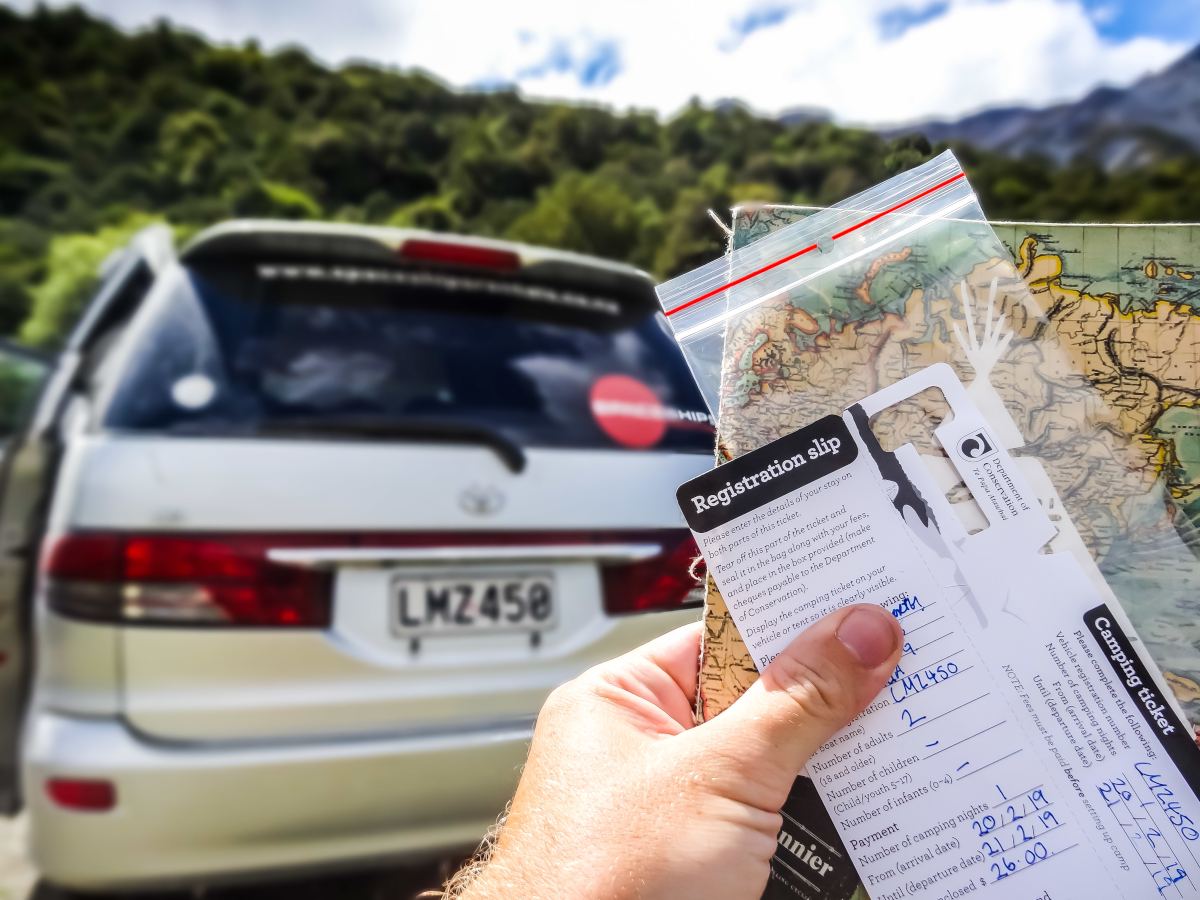
Support NZ's scenery by supporting DOC and their amazing campsites in remote locations
How to find DOC campsites
All DOC campsites – just like local or regional campsites and all other campgrounds – are listed in the free camping & road trip app (for Android and Apple), so finding these campsites is easy.
The app not only describes how to get there, it also shows you. Some DOC campsites can be booked online, via the app, but most have an honesty box. Please fill out the registration card, tear off the receipt to put on your dashboard, put the card with the money in the supplied envelope and drop it in the honesty box. Or you can check the DOC camping website.
As lots of DOC campsites are located in remote areas, it means that often a small gravel road leads to the campsites. Therefore it is good to know that your Spaceships compact campervan can handle these kind of small roads with ease. It is much easier to get to these campsites with a Spaceship than with a big van or motorhome. And yes, you are allowed to drive your Spaceships campervan on these gravel roads.
What are holiday parks?
Another option to camp legally in New Zealand is to spend the night at a holiday park. Holiday parks are commercial camping sites with lots of features, for example, a kitchen, TV lounge, washing & drying machines and more. It is what overseas travellers mean when talking about camping. Top 10 Holiday Parks is a well-known chain of holiday parks in New Zealand.
Holiday parks are often located close to a town or city, on the fringe or just outside of town. It is a great option for travellers who are looking for a bit more than what the basic campsites of DOC offer. It is perfect for charging your gadgets, washing your clothes or enjoying a bit more luxury before heading off to the next remote freedom camping site.
Do I need to stay at powered campsites?
Not at all. Roadtripping with a Spaceships campervan means that you are super-flexible. The smart battery system of a Spaceships campervan is self-charging, it charges as you drive. None of the Spaceships campervans can or need to be plugged in at powered campsites. Driving and camping with a Spaceship are easy.
And our self-contained campervans come with solar panels on its roof, which means you can stay off the grid for even longer.
The only reason Space Travellers decide to stay at a powered campsite is when they want to use appliances that use more power than the USB ports of the campervan can give them. Or when they want to charge devices that require more power, like a laptop.
Hiring a Gadget Charging Pack (with a mains plug and cable) from us could be a good option. It's a sort of extension cord with a special camping plug on one end and a regular power socket plug (NZ style) on the other end. You'll plug on end in the power box of the campsite and the other end is where you plug in your device's plug. It won't plug into your Spaceships campervan. All our campervans are self-charging and do not come with 220V, they only come with USB sockets.
Will the changes to Self-Containment rules impact my camping experience?
No not all. The new rules for self-containment certification have to do with how it is decided whether a campervan is self-contained or non-self-contained, the certification process. It’s the certification rules that change.
Where you can camp remains the same.
- Non-self-contained campervans must stay at campsites or campgrounds with basic facilities. There are lots of these free or budget campsites in New Zealand.
- Self-contained campervans can stay at designated campsites without any facilities. These campsites are even more basic than the basic ones mentioned above.
Both types of campervans have heaps of campsites in remote locations to choose from. See these free camping & road trip app for all the details about where to find these free & budget campsites.
Also, both can stay at holiday parks aka commercial campsites that feel more like big campings you may know from holiday spots in your home country.
Do you have to be self-contained to camp in New Zealand?
Having a self-contained certificate is needed when you want to spend the night at campsites that are exclusively for self-contained vehicles. Why are they exclusive to these kinds of vehicles? That's because there are absolutely no facilities at these campsites. There are no toilets, no running water, nothing. Therefore only campervans or motorhomes that are self-contained can spend the night there.
But you won't be missing out on a great camping experience as there are so many campsites where both self-contained and non-self-contained campervans are allowed to spend the night. Also, in remote locations, far away from towns or cities. No worries.
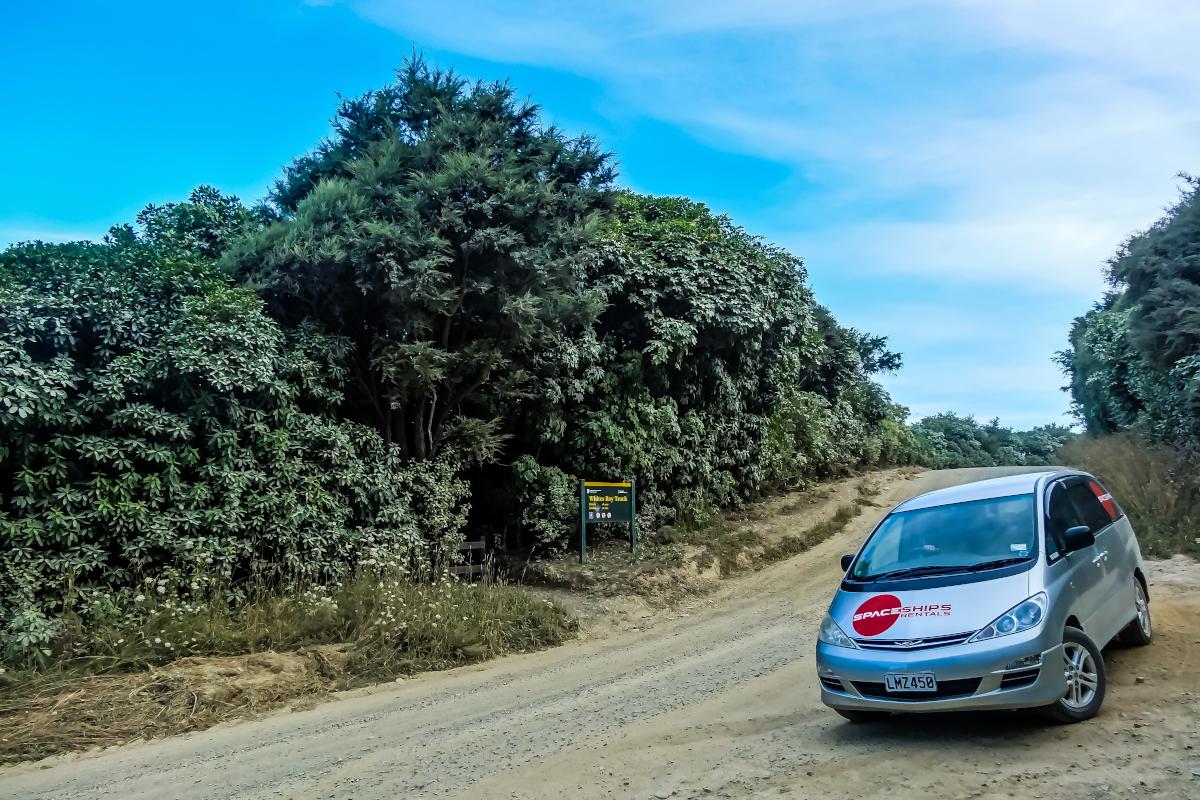
Yes you are allowed to drive your Spaceships on NZ's gravel roads to get to amazing remote campsites
The real freedom to camp and the feeling that goes with it comes from spending the night at basic or standard campsites where all campervans are welcomed. DOC, New Zealand's Department of Conservation manages many of these amazing freedom camping spots. Most of them are located in remote areas where you'll wake up hearing the sound of NZ's native birds. That's what we call freedom camping.
And yes, there are so many camping sites where you are allowed to camp with a non-self-contained campervan. You won't be missing out. Actually, you will be saving money when going on a road trip in a non-self-contained campervan.
Freedom camping done the right way, is having respect for the beauty of New Zealand and staying at campsites or campgrounds where it is allowed to camp. And yes, these can be in the middle of nowhere. That's what New Zealand is all about, camping in awesome places. Explore and respect New Zealand.
Mix it up: hosteling on your campervan road trip
As your Spaceships campervan drives like a regular car, you can go to places big motorhomes can't go. This means you can go to even the remotest (DOC) campsite, whether free or paid. And even the paid ones are a cheap option for camping in New Zealand.
But you can also mix and match and drive your campervan to any of the many hostels or budget motels in New Zealand. Sometimes it's nice to spend one or two nights there, especially if you plan to visit the sights in a city or town. As you'll save heaps when driving around in a fuel-efficient Spaceship, it's nice to treat yourself to the "luxury" of a hostel or budget motel every once in a while.
Tiaki Promise: leave no trace and take only memories with you
As a responsible and caring tourism operator, everyone at Spaceships is committed to the Tiaki Promise. The Tiaki Promise is a commitment to care for New Zealand, for now, and for future generations.
We expect every Space Traveller to have that same commitment, so we can care for our amazing little country with its scenic variety together. Travel responsible. Leave no trace, just footsteps. And don’t take anything home that is part of New Zealand and its heritage.
Dispose of rubbish in bins. If a bin is full take your trash with you and dispose of it at the next bin. Dispose of your self-contained campervan’s wastewater at appropriate dump sites. Be a responsible traveller.
More info about our commitment to the Tiaki Promise and our sustainability projects.
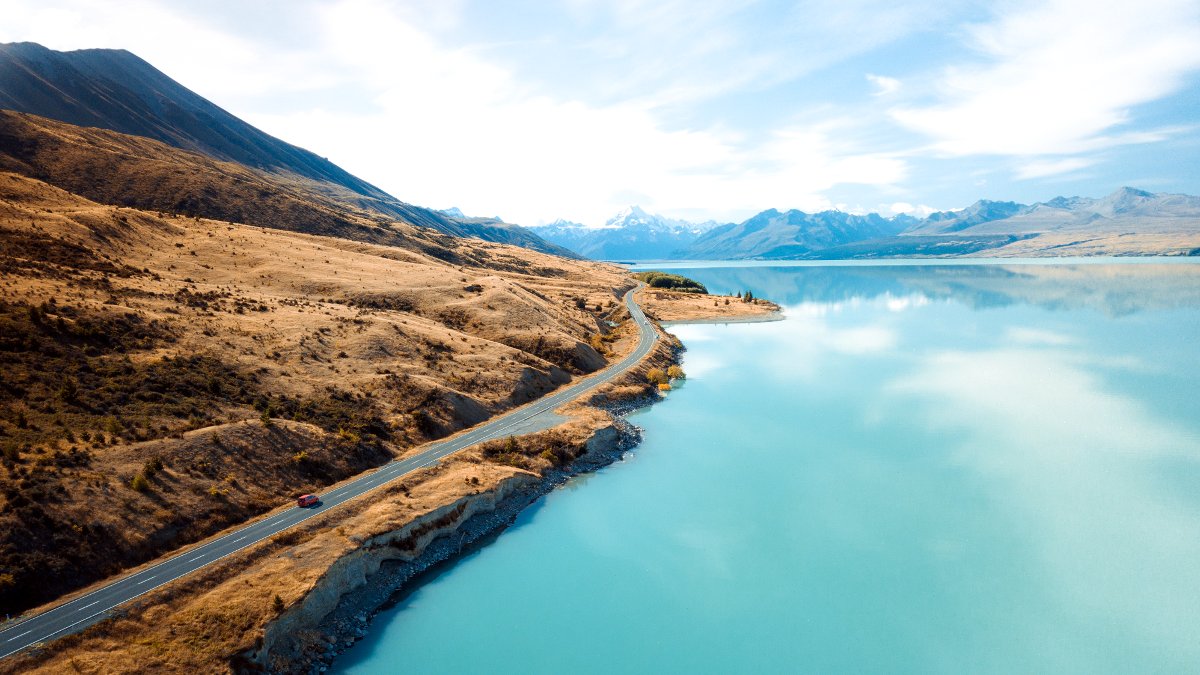
Let's keep New Zealand clean and beautiful so others can experience these amazing sights as well
Play it safe while camping in New Zealand
New Zealand weather can include four seasons in one day. Being prepared is important. If you are planning a walk in the hills or mountains it is best to take a day pack with some food, water, a rain jacket and spare warm clothes. You can browse the links below for further information on New Zealand.
- Visitor Safety Information from NZ Police
- Outdoor Safety: use the Plan My Walk tool from the Mountain Safety Council
- Safe driving tools & tips from your mates at Spaceships
Have a great #SpaceshipsRoadTrip
Have fun out there exploring New Zealand. There's so much to see and do. Please look after New Zealand while on the road. You can also check in at the local i-SITE (tourist information office) as you travel for information on where to camp.
Freedom camping top tip: if you're not sure if you can camp somewhere then don't assume. Please check the free camping app, ask at an i-SITE or check with a local.
Marty | Spaceships Crew
Marty is Spaceships’ residential digital geek. His favourite areas in New Zealand are the Catlins, Taranaki, East Cape and any place where a craft beer brewery or record store can be found.
His articles are a treasure trove of road trip tips, travel tales, and personal musings, all delivered with a dash of geekiness, humour and a whole lot of heart.